#i know. i KNOW the obvious answer is that one of them is infinitely more sad and useable for emotionally charged art
Text
thinking about the fact that so much DE art i’ve seen centers the IT IS TOO LATE FOR US mural and so little centers SOMETHING BEAUTIFUL IS GOING TO HAPPEN. not good or bad necessarily, but certainly very interesting and will make me a little insane if i think about it too much
#i know. i KNOW the obvious answer is that one of them is infinitely more sad and useable for emotionally charged art#but Something Beautiful Is Going To Happen lives in my heart and means so so much to me. yknow#disco elysium#also requisite admission that i have not played de yet. so this might just be a Me Problem
83 notes
·
View notes
Text
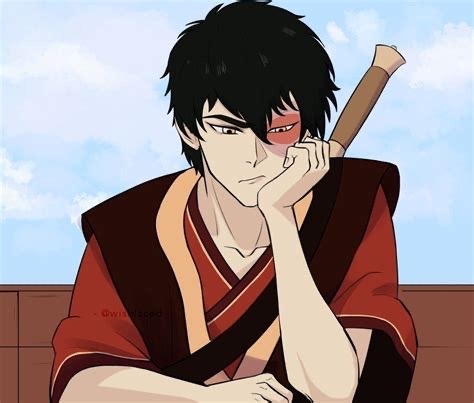
Modern! Au zuko things:
Has an entire album in his phone dedicated to you and only you, some were even from way before you were a thing and he was still a love sick loser.
Who am I kidding even after you two become a thing Zuko still is a love sick loser who stares at you lovingly, the hand that his head is propped up on almost gives way once or twice because he’s so lost within your natural self. If you were to catch him during this embarrassing moment, his face would become extremely flustered that you would begin to get worried for his health.
Uncle Iroh would tell you stuff that Zuko admitted to him in confidence while he was crushing hard after you two officially become a thing, you found it adorable and endearing to know that Zuko felt that way and saw you in a light of which you didn’t even see yourself, Zuko on the other hand wanted to die right then and there as he burrows his face into his hands with his ear read as cherries.
During the times when Zuko was crushing hard, his subtlety was nonexistent especially to uncle Iroh, who saw through Zuko’s every interaction with you as a man longing for a love that was unparalleled, unmatched and without equal but more importantly a love that was the purest by all definition. And now as he watched you and Zuko shared sweet smiles, gentle touches of the hands and a abundance of unified joy, he could honestly say that Zuko had found the love he had been chasing after all this time.
Uncle Iroh approving of your relationship would probably be important to Zuko as he loves his uncle dearly and admires him greatly for his infinite wisdom, he was practically Zuko’s father with how much influence he had in the young man’s life.
So needless to say Zuko is ecstatic when Iroh asks him if you’d like to come over for tea sometime soon. He was originally worried about how his uncle would view you but the fact that his uncle liked you made all the worries and fears all worthwhile as he felt that crushing weight lift up from his chest.
Zuko runs warmer then most so he uses this to his advantage to be close to you by holding your hands between his own or by holding you from behind as as he innocently rests his chin on your shoulder.
‘Is there a reason you’re holding me?’ You’d ask.
‘Keeping you warm.’ He’d reply as though the answer was obvious.
‘ I’m warm enough with your hoodie on alone, now this is just overkill, you’re killing your partner with your inhumane body heat Zuko.’ You would joke as you tried to get away from him, only for Zuko to tighten his hold on you and burry his face into your neck, making you squeal at the flurry of kisses he was planting there.
Zuko loves being with you so much to an embarrassing amount but he couldn’t help it! He spent so long avoiding asking you out that now that he’s got you, he wants to spend every possible opportunity to be with you without it coming across as borderline suffocating.
Zuko could spend an entire week with you and it still wouldn’t be enough for him!
Star gazing dates/ picnic dates that are interrupted by a flock of turtle ducks, which makes for great pictures that you would then send to uncle Iroh later on, just as one of the turtle ducks decided to sleep in Zuko’s lap and he’s gone all awkward on trying his hardest not to wake them up. Which meant more pictures were sent to Uncle Iroh. (I just like the idea of turtle ducks being in the modern au. They’re just too cute not to!)
#zuko x y/n#zuko imagine#zuko imagines#zuko x you#zuko fanfic#zuko x reader#atla x you#atla x reader#atla imagine#atla imagines#atla fanfic
591 notes
·
View notes
Text
Never Love Another
It was no secret that when Jason came back he came back wrong. The violence and pit rage were the most obvious ones of course, but now that it had faded other little things had started to surface. He had noticed this deep loneliness and homesickness for something he couldn’t remember or name. He didn’t know what to do about it besides, well maybe try to find someone who could sooth the loneliness. But it wasn’t working, if it wasn’t for how bad he wanted a romantic connection he would have thought he was aromatic now because he never, Never felt a spark at all, with anyone.
He actually talked to Dick about it, and let him talk Jason into therapy, but that didn’t help, and when Tim found out about it the paranoid little shit started doing tests. And that was how fucking Bruce found out, and he was even more paranoid so they would not believe it was a coincidence or anything and more tests were done. No answers were found until Batman called in a favour from JLD, Jason tried to insist it wasn’t worth it but Batman said his happiness was the most important thing, which made Jason shut up and make a face like he’d bitten into a lemon.
Now he was just trying to avoid admitting that they were right. “What the fuck do you mean cursed?!” Jason demanded from Constantine who shrugged and lit a new cigarette from the butt of the last one.
“I don’t know mate,” He said with a shrug, taking a drag. “While you were dead you must have pissed off some pretty powerful bastard because it’s Not a petty curse either, not the sort of thing I or Zatanna can break. Looks like it’s to ‘never love again’ or something like that, I don’t know it’s not exactly written in words.” He explained and Jason dropped his head into his hands with a groan.
Of course, why wouldn’t this happened? Honestly though as the literature nerd he was he had to think whoever had cursed him must have been of a similar temperament, given how melodramatic is was. He wished he could remember what the fuck he had done to get cursed like this?
“So how would we break the curse?” Batman asked, ever solution oriented.
“Don’t know Bats,” Constantine admitted with a one shoulder shrug. “I think you’d have to find whoever cursed him and convince them to lift it. They’re a seriously powerful denizen of the Infinite Realms so we could try a summoning but there’s no guarantee that is would work, and if not you’d have to go to them which would be veeery risky. I’m not sure it’d be worth it honestly, I mean it’s a bit of a blessing isn’t it? Not like our lifestyles really lend to romance,” He snickered and everyone ignored him.
“How long will it take to arrange a summoning,” Nightwing demanded with a frown, why he had to be here too Jason didn’t know but… he was privately a little grateful that he was.
“Mmm A couple of weeks, we have most of the stuff required and the unique ingredients aren’t that hard to find,” the magician hummed thoughtfully. “I’ll remind you, there’s no guarantee that it’s going to work,” he reminded and even though Jason hadn’t looked up he could practically sense the twin scowls Dick and Bruce were shooting John.
“We’re going to try it,” Batman growled and Constantine hummed.
“Sure, whatever you say, I’ll start setting it up.”
------
Those two weeks were plenty of time to panic about who it might be, what Jason might have done to cause this, and what the being might do if they answered the summons. They had a lot of preparations to do, but when Jason tried to say they shouldn’t do this Bruce and the others insisted that they needed to know ho had it out for Jason if just in case they decided to cause more problems. There was discussion about if Jason should be present, but he really wanted to be if this was happening, he wanted to see the monster that had cursed him.
Constantine and Zatanna were both there the day of, as well as Batman and Nightwing, and superman, just in case things went horribly wrong. The spell was… stressful for Red Hood, the portal it opened made him feel like he was staring into the Lazarus pits again, even if it was missing the feeling of rage.
It felt like they were all holding their breath for a few long minutes waiting to see if the summon would be answered. Jason was just starting to think that no one was going to answer when a white booted foot stepped through, followed quickly by the rest of the body.
Jason blinked, staring uncomprehendingly at the being that had answered the summons, not because they were some incomprehensible monster, but for the opposite reason, because they looked so human. Not normal, their ashen skin, pointed ears, and white hair that disregarded gravity, made sure of that, but he looked human other then that. A head or so shorter then Jason, lean and agile looking with unusually wide hips and soft curves for a man. His ears were pierced three times, two having studs like planets and a set of dangly ones shaped like a sun and a moon which glinted in the light of the glowing crown on his head. It looked like ice that had trapped the northern lights within them, it was beautiful, it took his breath away.
He had a vague feeling that the others present were talking, but Jason and, it seemed, the spirit, were not hearing them. Jason couldn’t tear his gaze away from the creatures Lazarus green eyes, why did he feel so familiar.
“Jay,” The being breathes, a bright smile spreading across his face, revealing little fangs that shouldn’t have been so adorable. “How did you, you shouldn’t have called me, I don’t… You don’t remember me do you? You shouldn’t,” He breathed, the smile dropping as the initial joy at seeing Jason overtaken by worry.
“We want to know why you cursed my son!” Batman shouted, suddenly cutting through the odd, tunnel version they’d both been trapped in and sending them both reeling. Jason had been leaning forward and ended up stumbling.
“Oh,” The creature sounded, his brows furrowing as Jason finally looked around and noticed how Constantine was cowering.
“Batman! Don’t yell at the fucking king of the Infinite Realms!” Constantine practically squeaked. The king?! How had Jason pissed off the king?! “We’re so sorry for disturbing you your Majesty, please don’t destroy us,” the wizard said, sounding like he was on the verge of a panic attack.
The being still in the circle cackled and crossed his legs under him, sitting on air at the odd cape that looked like it was made of the night sky billowed behind him. “Don’t worry I’m not planning on it, honestly, I am happy to see you again Jaybird,” He said with a soft smile, his gaze going back to Jason like he wanted to drink him in. “You’ve grown so much pretty-bird, are you happy? Do you like being alive again?” He asked worriedly. “You’re always welcome back-“
Nightwing read that as a threat that this supposed King was going to kill Jason again and yanked him back, standing between Jason and the stranger, even though he was shorter and slimmer then Red Hood. “He’s not going anywhere! Why did you curse him?” Nightwing demanded again.
“It wasn’t a curse, it was a price,” Phantom said with a frown. “I would let him go, but not to love another.”
“Love, another?” Jason asked this time, his voice harsh and soft. God how his heart ached, why couldn’t he remember something that made him feel so much longing and pain?
“Another,” Danny said, his voice softening again. “While you were in my realm we were… Close, very close. But you couldn’t let go of life, you weren’t ready to give yourself to me, not fully,” Danny bit his lip for a moment. “It hurt, but I only wanted what was best for you Jay, so if you had unfinished business… well, I let you leave. I did! I let you go, but-but maybe I was selfish, I was going to be waiting decades for you and-and I couldn’t stand the idea of waiting that long only for you to have fallen in love again with someone in life and, even after dying and remembering me, choosing to stay with them! So that was the deal, you get to live again, but only if you don’t love again, and you come back to me when you’re done. You agreed.”
There was a long silence as everyone processed what the king had said, it was Constantine who reacted first, rounding on Jason. “You dated the King of the Infinite Realms!?” He demanded, flabbergasted.
“Ugh, just call me Danny, I’m the king sure but I don’t care much for the title,” The bring in front of them corrected with a grimace.
“Danny,” Nightwing said, holding out his hand in a sort of placating gesture. “Can you… change the price?” He asked uncertainly.
“NO!” Danny said instantly, his voice echoing in a way that made those present flinch. “No, the deal still stands. I let him leave my kingdom, but I won’t completely give him up. I can’t, I can’t,” Danny said and Jason could swear he saw Danny’s eyes glimmer with tears.
“It’s alright,” Jason said, softly as he could, Danny’s pain called to him in a way he couldn’t explain. “It’s just, I’ve been lonely, I’ve felt like I’ve been missing something since I came back. I thought it was love, but now I think, I think it’s you. I’ve been homesick, for You,” He said, stepping closer again and holding out his hand. John yelped when Jason broke the circle, but he was being ignored.
Danny’s eyes widened in shock, then welled over with tears as he reached out and took Jason’s hand, his feet landing back on the ground as he stepped closer. “I’ve missed you too Jaybird, I’ve missed you like you wouldn’t believe,” He practically whispered. As he stepped over the line a white ring ran up and over his body, leaving a- well, for all appearances a human man with similar features and inverted colours, maybe a little younger then Jason. “I’m sorry you’ve been lonely, but I wanted to let you live your life. If you want, I could visit more? I would be happy to put in the work to, start over, let you get to know me in this life?” He laced their fingers together, taking Jason’s other hand as well, standing chest to chest and looking up at him through dark lashes, framing beautiful clear blue eyes.
“I would love that,” Jason breathed. Startled by a sound of disbelief behind him, he’d forgotten Nightwing was there and he glanced back. “What? It solves the problem of me being unable to love, it turns out I was just trying to love the wrong people.
#dead on main#danny phantom#Jason/Danny#jason todd#batman#dc x dp#nightwing#fanfiction#john constantine#Jason and Danny fell in love while he was dead#Danny made a compromise#ghost king Danny#this isn't edited#I'll edit it and post it on AO3 later
2K notes
·
View notes
Text
In Judaism, one alternative way of referring to converts is "Jews by Choice."
If a parallel term exists in Xtianity I am not aware of it, but I would like to propose that it really should exist, albeit not just in reference to converts but to all Xtians. Every Xtian should get the opportunity to fully understand their faith in context and to make an informed decision to choose it for themselves. As it stands, many Xtians are deeply ignorant about Jewish history (before and after the formation of Xtianity), the original cultural context for the stories in the Old Testament, the cultural Jewish context that Jesus existed and taught in, the critical historical (scholarly) read of these texts, what they probably meant to the Israelites who produced them, and what they mean to Jews today and how we read these same texts differently in our religious context.
This creates a problem, where Xtians are taught only the narrow band of context that their church deems it important for them to know, and even that is frequently inaccurate or so limited in scope as to make it inaccurate by omission.
And this is because the reality is that the Tanakh (that is, the Hebrew and Aramaic scriptures that the Old Testament is based on) does not naturally or inevitably lead to the Jesus narrative. If you are starting from a Xtian perspective, and especially if you read the New Testament first and then and only then dive into the Old Testament, the Jesus narrative is obvious to you because you are looking for it, expect to see it there, and are coming at these texts with that reading lens in mind. And it's not that you or anyone else is nuts to see that narrative there - there are plenty of solid Xtian reads of these texts that make sense if you already believe in Jesus as presented by the New Testament.
But what the vast majority of Xtians aren't taught is how to approach the Tanakh from a Jesus-neutral perspective, which would yield very different results.
Now you might fairly ask, why would they *need* to approach the Tanakh with a Jesus-neutral perspective? They're Xtians! Xtians believe in Jesus, that's what makes them Xtians!
My answer is multi-pronged: First, I believe that G-d wants a relationship with all people, and speaks to us in the voice we are most likely to hear. That's inherently going to look different for everyone. And that's okay! G-d is infinite, and each of our relationships with G-d are going to only capture the tiniest glimpse into that infinite Divine. Therefore, second, when approaching religion, everyone sees what they want to see. If you nothing religion but find your spirituality in nature, you're going to come at these biblical texts with that lens and take away from them similar things that one might take away from other cultural mythologies. If you, like me, are coming at these texts with a Jewish mindset, you are going to come away with a portrait of Hashem and our covenantal relationship as Am Yisrael. And, of course, if you read with a Xtian lens, you're going to see the precursor narratives leading up to Jesus. That reading bias is not only understandable but good or at least deeply human. Everyone sees what they want to see in these texts. There is no objective or flawless way to read them, and to claim that there is, is to claim that not only is there only one answer, but only one kind of relationship that G-d wants to have with people, that you personally happen to know what that is, and that everyone else is wrong. I am sorry, but if you believe that - if you truly think that you in particular (and/or the people you happen to agree with) know the mind of G-d, then you do not worship G-d. You worship yourselves, because to know the entirety of G-d would require you to be G-d. There's a term for that. That doesn't mean there aren't wrong answers too. But it does mean that there is no singular unimpeachable reading of the texts. What you see in these texts then, says far more about you than it does about the texts themselves or G-d.
So the question then becomes: Why do you want to see this? (Whatever your "this" is.) If your read of these texts is something you choose, why do you choose to see what you see? And is it a meaningful choice if you are not taught other ways of knowing, other perspectives on these texts, and to think critically while exploring them?
Judaism inherently teaches a multiplicity of opinions on the texts, and maintains that they can be read to mean different things, even at the same time by the same person. Deep textual knowledge and methods for learning more, asking questions, challenging accepted answers as a way to discover new meaning, and respectful disagreement are baked into our culture and methods. Some Xtians of some denominations have analogous processes, although on the whole still emphasize correct unified belief over correct action with a multiplicity of belief. I am not suggesting here that Xtians stop approaching their own scriptures as Xtians or adopt Jewish methods instead. What I am suggesting is that Xtians should be taught a fuller picture of these texts and learn other perspectives so that they (1) understand their own beliefs and why they believe them (or after further inquiry if they believe them), and (2) understand and respect that this is what they are choosing to believe and that it is not the only thing one could reasonably believe. Because (3) if not, they are more susceptible to having their faith shattered at random by something unexpected, and will connect less to their faith as a relationship with G-d and more as an obligation based on an unchallenged world view.
And, frankly? (4) It will help them to be better neighbors, to love their neighbor as themselves, and to give to others the respect that they would like to receive.
Being taught the historical context, Jewish history before and after Jesus, the differences between the Old Testament and the Tanakh, the timeline of the development of Xtianity in relationship to rabbinic Judaism in the wake of the destruction of the Second Temple, the development of church doctrine and the various splits amongst the denominations, and Jewish readings of the Tanakh would give clarity and desperately needed context to Xtians about their religion. Is there some risk that some people, upon understanding these things would drop out of faith entirely or, like me, discover that they are actually meant to be Jews? Yes, definitely.
But let me let you in on a little secret: you don't want those people to begin with. You really don't. Because the reality is that if a person is not called to relate to G-d through Jesus, eventually that person will learn this about themselves one way or another. If they are given the information and tools to make a meaningful choice, they will part company on good terms. If not, they will likely become disillusioned and leave the church in pain, anger, and even trauma. They will bring that out into the world with them, and spread the bad news about the Good News making it even more likely that other people who were already on the fence will jump ship on bad terms. You cannot trick people into a meaningful relationship with G-d. You can only give them the tools they need in order to explore on their own and the rest is between them and G-d.
And the bottom line is that you don't need to and should not be afraid of knowledge. If your faith cannot stand up to scrutiny, then it deserves that scrutiny tenfold. The people you lose from the flock? You would have lost them anyway, because we aren't in the driver's seat here. G-d is. Hashem called me to be a Jew with just as much love and desire to connect as G-d calls Xtians to the church and to Jesus. A faith examined is a faith deepened or exposed in its weakness. And if it is the latter, don't you want people to know this sooner rather than later in order to fix it?
So my proposition and wish for Xtians is that they become Xtians by Choice. That they delve deeply into the origins and context of their faith so that they can be 100% certain that they understand their Xtian faith and why they choose to relate to G-d through that lens.
#every hour is theology hour around here apparently#interfaith#this is tochecha from an ex-Xtian ger#who desperately wants for my Xtian family friends and neighbors the level of peace and security in their faith that I now enjoy#the church is not doing its congregation any favors by under-educating them on these matters#Xtians deserve better and should demand better from the church#xtianity#anyway if I have any Xtian followers here who would like book suggestions lemme know
573 notes
·
View notes
Text
3e: Winners and Losers In Lawful Space
Planescape is a silly place.
Dungeons & Dragons is a wholeheartedly silly game, and it’s important to remember that what makes it silly is an expansive growth out of a particular root. It is a tree of many branches but thanks to the way that it encourages people to build their own things on top of it, it has become a sprawling kind of folk narrative and generally accepted consensus material that then a company comes along and tries to augment and supplement. Still, as much as a corporate mind is at the head of what gets published, what gets handed to that corporation is going to derive from the mind of a dork who likes D&D. To that end, D&D’s lore is a constant push-pull between the kinds of nerds who like organising lists and the kind of nerds who like to invent new types of dragons they want to have sex with and they’re all trying to integrate one another’s material because that’s how nerds demonstrate mastery over a topic.
The result is that D&D lore is composed of parts that neatly and smoothly fit together and parts that should be airbrushed on the side of a van, and all subjects exist in a space between those two points, on a spectrum. And nowhere is this more evident than in the way that 2e’s setting Planescape introduced elements that 3rd edition tried to hide.
Planescape, as a setting, exists very close to the ‘airbrushed on a Van’ side of things, and it’s extremely obvious when you look at its roots in 2nd Edition. In this space, much of what makes Planescape Planescape was codified. For those of you unfamiliar, Planescape is a setting made up of the idea of ‘planes’ as distinct, discrete universes with their own rules separated not by time and space, but just by barriers or magical boundaries. You know how Narnia is supposed to work, with the wardrobe? It’s like that, but there are a lot more wardrobes and they all go to different places. Think a sort of multi-level Isekai scheme.
Anyway, it’s a setting with like, multiple whole universe-sized worlds, that may or may not have planets inside them, some of which follow a very narrow set of identifying rules, like the elemental plane of Fire, which is full of Fire, or are just like ‘here, but a bit weird,’ like Bitopia, which is a whole plane that is mirrored vertically at a certain height. If you look up in Bitopia, you see another whole country up there – that’s why it’s called that. Also everyone there is bisexual.
Planescape sought to build out more of that structured universe and then in each structured space, fill it with interesting notions. But the structure is a little odd, in that it’s hard to make an infinite number of chairs organise neatly, someone is always putting out one more where they shouldn’t. That means there are tidy diagrams of the Planar cosmology, and then you look inside any of the bubbles in that diagram and find it’s full of gibberish.
It was in 2e that, as far as I know, we were introduced world-wise, to the characters of the Modrons.
There’s a whole writing form that involves referring to Modrons in deliberately obtuse ways, with Modrons being the individual, plural, categorical, and utility terms for this people, but what you need to know about them is that Modrons are weird lil guys that are made out of a basic geometric shape – pyramid, cube, dodecahedron, all the way up to sphere (or down to sphere, depending on who you ask). They are truly perfect Lil Guys, a byproduct of a plane of true law and order which doesn’t in any way cohere to what humans (the people playing the game) necessarily assume about law.
They make a lot of sense in a storybook kind of way where you don’t need to have big answers for what they are or how they work or even how their philosophical bias towards pure lawfulness works. In the world of 2ed, where sometimes things that sound like they should be well explained, clear rules are kinda yada-yada-yada’d in a space that you might imagine is flavour text, the Modrons left a bunch of questions unanswered and seemingly, that was good. It was good that they were heavily ambiguous because what was the life cycle of ‘an orb?’ Any answer made them less mysterious and pushed them away from the oddness that they represented.
Anyway, 3e was an attempt by a serious company to do serious things and that’s why when they went back to talk about the Creatures That Lived In The Lawful Planes, they came up with the Inevitables.
Inevitables are the demons of small minds, writ large. Literally, the point of an Inevitable is to be a Lawful Neutral version of a Demon, an entity that exists purely based on rules, coalesced out of a world made of rules, and with nothing holding them back from expressing that. Each of the Inevitables is meant to respond to a rule in the universe and then enforce it. They are self-appointed near-immortal construct cops, and they’re meant to oppose things and people that break the rules that they, specifically, are meant to care about.
These rules are completely out of whack, though, because one of them is meant to enforce say, justice, another the inevitability of death and another, the way the desert is a fixed ecosystem that nobody should try and change or interact with. And in that case, there are a bunch of plants that the Inevitables are going to have issues with, that don’t seem to be capable of forming complex political allegiances.
There’s a really interesting distinction between Inevitables and Modrons, to me. Modrons are weird and interesting but also, there’s nothing they can do that answers a question. Inevitables are a fun challenge that’s supposed to be present to oppose players or potentially be recruited into an adventure, but not for too long. But Inevitables, the 3e attempt to populate Lawful Planes with A Kind of Guy, sort of fell apart and are now more of a trivia question while Modrons have endured into 4th and 5th edition.
I don’t think there’s some greater, better reason for it or anything. I don’t think that Inevitables failed because they were Bad Design or something. But I do think that for me, the way that Modrons represented Weirdness was much more interesting than the ways the Inevitables sucked weirdness away with their simple, clear consideration of certain things as being part of natural reality.
After all: Inevitables would hunt down people who extended their lifespans because ‘everyone must die.’ But Inevitables were immortal. That’s a pretty interesting thing to juxtapose and maybe a character could struggle with that.
Or maybe they could make a big speaking trumpet and demand that everyone else refer to them as a Spokesmodron which is, in my opinion, much funnier.
Check it out on PRESS.exe to see it with images and links!
101 notes
·
View notes
Text
Fionna and Cake theory: Simon the Artist
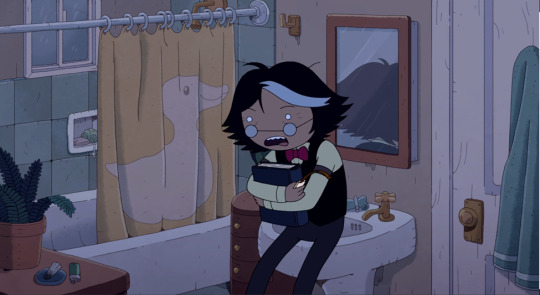
Nothing like a good old creative panic attack.
Fionna and Cake good. Haven’t been excited about a show like this in a long time, though it being a part of Adventure Time does help quite a bit. I was holding on to some cautious optimism for the show when it was announced as yet another big IP series covering the multiverse (still waiting to groan at THAT scene where Prismo has to explain to us about there being infinite universes), but as usual, Adventure Time’s crew continues to surprise me with its creativity, humor, and thematic resonance.
The most striking part about Fionna and Cake so far is just how deliberately the show wants us to differentiate it from the original Adventure Time.
We’re getting shots where Simon pops an artery from his arm, a theme song that explicitly talks about suicidal ideation, discussions of rent and financial problems, and curses no longer disguised with AT’s usual dialogue. Adventure Time has always had violence, thematic density, and juvenile rating pushers, but they were always reserved at small points. Meanwhile, these are factors that are just casually shown and discussed in Fionna and Cake every 3 minutes or so. This is not an all-ages miniseries, it’s for young adults. (hint: this will be relevant later)
Let’s get right into it. This is much less a speculative lore theory and more on what thematic direction the story may be going.
Before we do, let’s get this out of the way first. This theory assumes that the current Fionna and Cake world is all a part of Simon’s head and not merely a separate multiverse, which… I’m certain is fact for the following reasons.
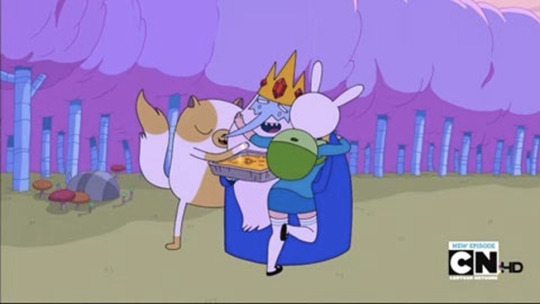
The immediately obvious piece is that Fionna and Cake was always the Ice King’s fanfiction. Now if you’re versed in AT’s continuity you’re probably going to be asking about the red light in Fionna and Cake + Fionna and… I’ve no answer for it unfortunately. It’ll probably be relevant later in the series and possibly age this post like milk but for now, we’re not here to focus on the how, but the why.
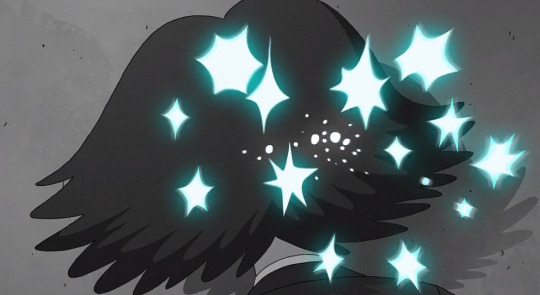
Second is that the intro and the ending of Ep 2 literally show Fionna’s world spilling right out of Simon’s head like an animated world out of a frozen brain. If that isn’t clear enough-
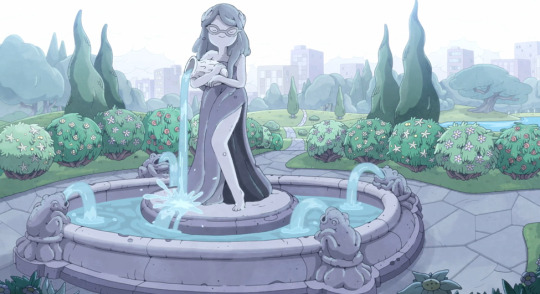
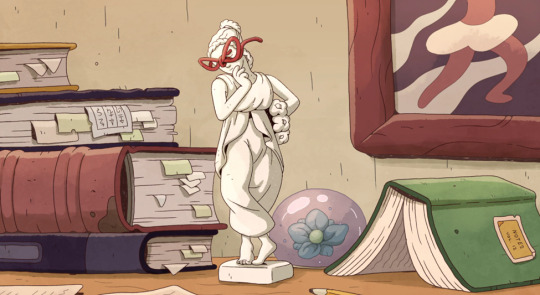
Didn't realize this until writing, but these glasses are just plastic made to look like Betty's
There’s no other explanation for this other than that this world is artificial or influenced by Simon in some sense. Fionna even specifies that the statue went under renovation 12 years ago, but nobody seems to know who it is. Considering how Finn looks in the episode, it’s likely that it’s been that long since Betty’s sacrifice in the finale.
With that out of the way, here it goes.
The reason Fionna and Cake exist in the first place is because the creators found Natasha Allegri’s genderswap designs charming and wanted an in-universe reason to use them the Ice King wanted to create trashy, wish fulfillment through art. It was a phase.
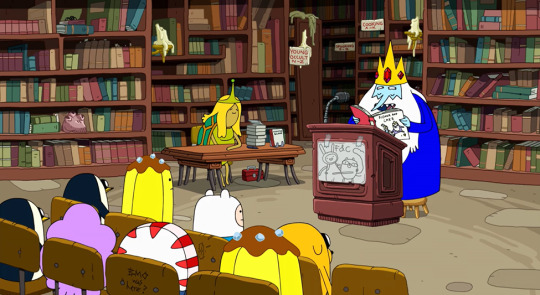
Definitely changed that image for publishing.
Simon can argue if they’re good or bad but it’s undeniably his art. It’s not just a portfolio he left behind in a closet, it’s an experience that was shared with a larger audience.
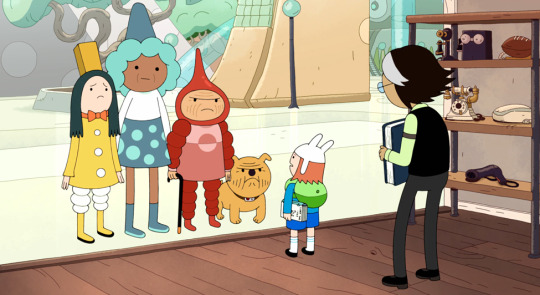
And even if wasn’t liked at first, the citizens of Ooo seemed to have come around to it. And some of them love it!
Whether Simon likes it or not, he has a fan base that is so endeared to the story he made all those years ago that they demand he makes more. Why let a good story, loved by many, go to rest when you still have some life and creativity left in you?
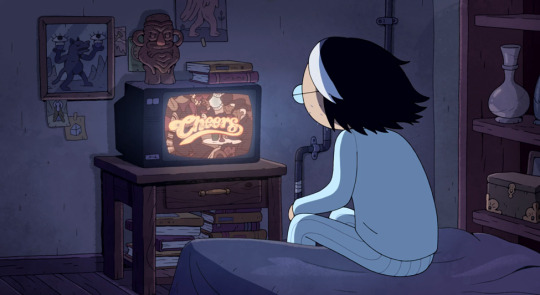
Can't move on in more ways than one.
Except, the problem is that Simon isn’t Ice King anymore. He’s aged out of it.
His real passion is history, he's an adult who who finds passion in the mundane and antiques from the past. And frankly, there isn’t much room for wish-fulfillment and fantasy anymore. Simon has responsibilities. He has a job and a daughter in a world that is moving faster than he can process.
And where Ice King wrote about looking for love, Simon has already had it.
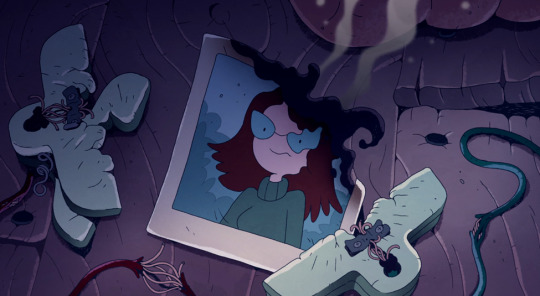
And lost it. His mind isn’t focused on the rosiness of finding new love, it’s grieving the one he already thought was the one.
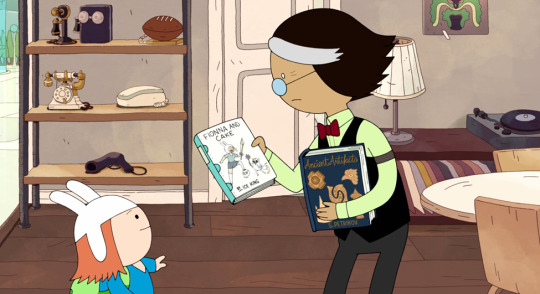
Wasn't he supposed to be good with kids?
Despite his new life experiences, all his peers seem to want from him is to make more of what they’re familiar with.
A story made from wants and wishes that he doesn’t even have anymore.
A story that was literally made by someone else at a different time. It’s a fiction he cannot connect to anymore, art that he’s embarrassed by. Yet also jealous of. Because at one point, the body Simon used to be in understood what exactly was missing from his life and could express that easily.
Seeing it again is like experiencing a retrospection of a cringey loser you don’t want to imagine having ever been. It’s not you anymore, and you don’t want to be reminded of that.
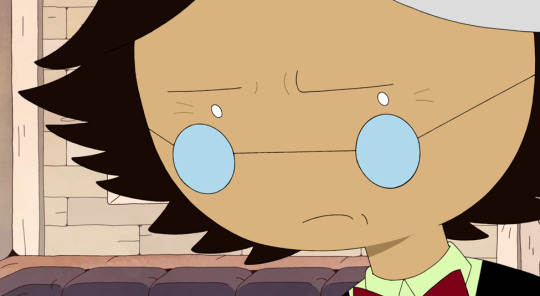
Because despite him having a new creative passion, no one seems to care about that. All they want is Fionna and Cake. And what is more lonely than other people misunderstanding what you’re trying to express?
If I failed to make it clear somehow, my theory is that: Simon’s relationship with Fionna and Cake is a metaphor for creators growing out of their art. And this new Fionna and Cake world is still comfort art born out of Simon’s current desires and perceptions.
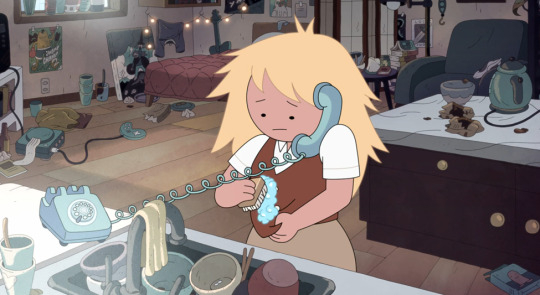
The snippet subtitles this “child holding a phone”. I guess I’m wrong. Essay over.
Episode 1 and 2 both have direct parallels with each other. They’re both about a protagonist who are feeling displaced from their world, living a phase of losing a significant other, leaving a thankless job, wearing a mask of stability in front of the people they care for, seeking a guru at the heart of the forest, and concluding that they no longer belong in their current world.
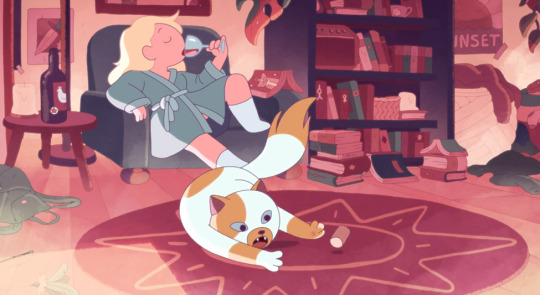
But more importantly, Fionna and Cake (the characters, the world, and the show) are no longer for an all-ages crowd. Fionna and Cake now feature young adults, curses, gore, alcohol, partial nudity, financial issues, morning routines, mid-life crisis, and overt suicidal ideation. These are the feelings that Simon relates to and possibly desires to express through art. Thus, his story and our new miniseries have warped that way.
Am I overthinking this? No. How dare you assume that.
Is equating the unconscious writings of his dementia-ridden self to Simon as his younger self seem a bit odd? ….Kinda. Again, it’s not the how but the why that matters in this case. I'm NOT crazy, I have proof that there is some acknowledgment of this directly in the show.
Rewatch the bar scene and apply this reading of the episode to what Simon says there:
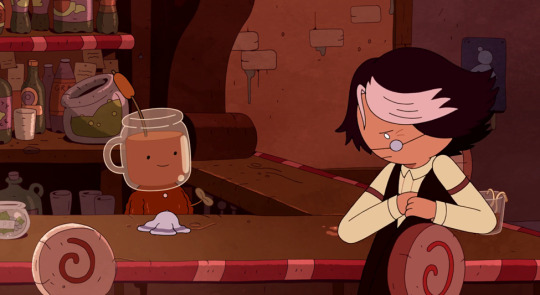
“Your old stuff, Fionna and Cake, honest to glob my man, is an inspiration to me.”
“My old stuff, I don’t really want to talk about my old stuff…”
“Why not? You should be proud! You wrote an entire extended universe in a fugue state if you think about it.”
"Simon cringes"
If you have ever shared art with a group of people in the past, you’ve had this conversation.
Not likely, not possibly, no perhapses. You HAVE.
And Fionna and Cake being an epilogue to a massive award-winning, near-decade-spanning, cultural sensation 5 years after it ended, might result in its creators feeling very retrospective about what audiences want from them now.
And how difficult it’s going to be to tell new experiences and tones from what’s come before. Also, come on. “Extended Universe?” That doesn’t sound like Fionna and Cake. That sounds a lot like something else.
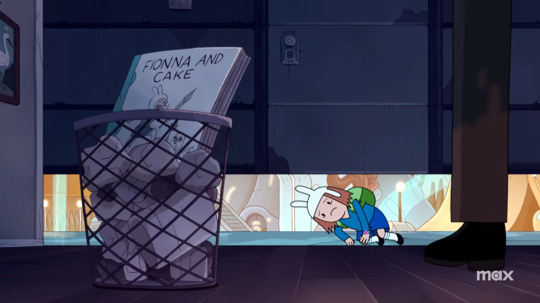
Again, seems bad with this kid.
One of the more profound shots in the main trailer for the show features the inconspicuously Finn-like kid crouching at her Fionna and Cake book in Simon’s trash. I believe this character is going to have a major role in two ways. Convincing Simon to be proud of what he’s accomplished and/or embracing that Simon wants to move away from his original work in order to create something new, or perhaps more likely, reinvent Fionna and Cake into what Simon relates to now.
We’ll just have to see what Simon thinks of his new Fionna next week.
PS. Talking as a fan now, WHAT IS UP WITH THE 1000+ TREEHOUSE IN THE INTRO?!!! ARE WE REVISITING THIS TIMELINE AGAIN?
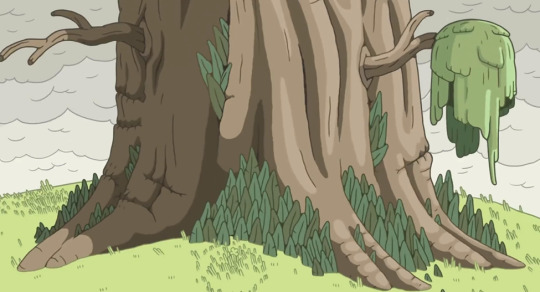
SOMEONE TELL ME NOW!!!
#television#adventure time#fionna and cake#simon petrikov#fionna campbell#animation#speculation#theories#fan theory#character analysis#discussion#adventure time spoilers#fionna and cake spoilers
560 notes
·
View notes
Text
dreamscape • zoro
note: hello! thanks for stopping by for a read ☁️ i took a spin on sleepy mosshead's napping habits and what came to be of it was this piece. it was an interesting "inner monologue"-esque study of how the man with near perfect resolve when it matters most, is actually quite the vulnerable person in his dreams 🥺
warnings: dream depictions of assumed death (strawhats), inner turmoil of inadequacy
everyone always assumed they knew why zoro slept so much. answers usually ranged between obvious rest and tlc, to snarky remarks of obliviousness to the sun and how high it hangs in the sky. despite the rapid responses and reactions to his snoozing form, it was a wonder why no one bothered to actually ask the swordsman himself.
yet he was thankful that the question has never come up, zoro admitted quietly to his own person as he jolted awake again for the subtle fourth time that bright afternoon on the deck of the sunny. it was a grace period of calm waters after visiting a small touristy island a day ago for restocking purposes, activities on deck simplified to those of solitude or seclusion as everyone took advantage of the chance to recharge. with the ability to control his composure by the minute millisecond upon settling back down to reality, not even the ever so observant eye of somebody like robin has caught the utter wave of disappointment that crashed through zoro every single time he came back to earth from his dreams.
he doesn't recall when it started or how it came to be like this — but he has been treating going to sleep the last while like a game; a puzzle that his mind created that felt like there were infinite possibilities upon starting but zero valid solutions after attempting.
why? why did it matter to him?
why did it fuel him so much to enter these mental landscapes, over and over and over? why does he have to remind himself on the cusp of falling into his subconscious that he could easily clear his head of all that roamed around up there, only to let himself tumble through the same sceneries constantly?
why was he here again—?
and why were you in front of him once more, just like the last thousand times?
zoro took in a breath, air staggering in his lungs. his eye adjusted to the fog surrounding the two of you, the looming mist bellowing over the rocky terrain environment in his peripheral vision.
he knew this was familiar, all of it, yet he relished in the way the edges of the dream twisted inward as it usually does. three more heartbeats resonating in his ears and then the smell will hit him with the force of several obliterating suns. the fog swirling around your hair and gliding over your skin wasn't fog at all, he noted almost nonchalantly. he watched as blooms of grey and black dusted across your features, his own growing ashen as he brought the corner of his arm up to shield his nose.
it was smoke.
"what the goddamn hell?!" he muttered the line as if rehearsed, sounding phony even to his own ears. zoro tried to orient himself though he doesn't have to, his eye darting around and taking in the flames that fluttered beyond the haze. like clockwork, he registered the ground he was standing on wasn't stable; in fact, it has been rumbling in tandem with an otherworldly uproar located behind him.
despair lodged itself in his gut when he turned around. he knew what sight would welcome him every time he got to this point. zoro felt them before he could see them — his crew and their fear, unadulterated and raw, icing his blood over despite the fires zeroing in and licking at his ankles.
someone was screaming for him but his name got muffled behind the horrific growl of the hidden beast amidst the shadows. the concentration of dust and ash stung at his eyes, his feet wobbling as the ground beneath him shook with the strength that would knock anyone else backwards without a moment's notice. one would think by repeating this dream sequence time and time again, he would know how to properly calculate the distance and strength needed to save everyone — but somehow, no matter what, it was never enough.
this was it — this was the part where he found out how nightmares were formed.
everything happened in slow motion. his gaze befalling on each of his friends, arms and hands outstretched to only him; the saviour that they were counting their lives on, the one that would choose to capture his crewmates' souls in safety and release his own into hell unbounded.
the earsplitting crack of the earth beneath them all, fissures dividing up the land and revealing blood red magma below. zoro finally toppled backwards, losing the grip on the hilt of his swords as he went, body numb upon impact. he couldn't move, he couldn't understand why he couldn't move— but it was futile, he was helpless, and his throat closed up with the guttural wail kept intact as he watched his friends disappear over the cliff's edge.
silence enveloped him instantly. sound and space vacuumed out from his vicinity before he could fathom the loss of the people he called family in such quick succession. the echoes of their horror still rattled within the forefront of his head before his mind took over. disorientation grappled him by the heartstrings when a hand landed on his shoulder, jolting him from his stance as he jerked his head upward.
there you were again, ethereal and pristine. nothing tainted had touched you and you didn't look like you were harmed in any way. a wisp of pure relief brushed his gut at the sight of your face, always a beckon of serenity for him in times past, but the feeling was quickly snuffed out and replaced by wrenching guilt by the words that you spoke next.
"you could have saved them."
"i..." his breath failed him momentarily. i'm sorry. "i... i know."
you blinked, once then twice, before nervousness twinged against your features. hesitantly, you took your hand off his shoulder and raised it in mock innocence. "w-wait, you actually sound distraught. luffy and chopper are okay! they were just play-fighting a little too rough on the upper deck, is all..."
a gentle breeze wafted across the sunny, picking up the scent of the familiar salty sea below that made zoro's skin prickle with awareness. he was awake. and you had no idea what he was referring to earlier based on that wary look in your eyes. they continued to scan his face as your words tumbled out of your mouth, awkwardness taking over and you tried desperately to fill the void of his silently tormented demeanour in front of you.
"when they fell over the railing and screamed, i just thought you heard them but decided to ignore them... like the rest of the crew..." your voice dropped several octaves when zoro casted his gaze away from you finally, noticing how his shoulders sagged a tad as he sighed gruffly. "... sorry for the dramatics— i genuinely thought you were awake. i didn't mean to wake you."
"no," zoro said quickly in retort, the sharp rigidness of his back straightening itself out. when he looked up at you again, it was his turn to notice how you pressed your lips together in a grim line, albeit finding yourself backed up in a corner with how he was handling this chance encounter.
this was all simple in retrospect and you couldn't have known what he was going through mere moments ago — for the last several moons, really — so he sighed again; gentler this time. "don't apologize. the dream wasn't so great anyway."
before you could process what he said, zoro got himself up in one fluid motion, throwing his arms up above him to stretch. the sound of ruckus and chaos still echoed from the other side of the deck, and you watched the swordsman make his way over. with his hand confidently on the hilt of one of his swords now, he turned his head around just enough to let it be known he was addressing you. zoro's other hand flicked up slightly, gesturing you to follow him.
"let's see what the commotion is about."
questions aren't zoro's forte. answers are expected to be concrete, purposeful, and solid. as much as he has molded himself to embodying that type of persona, any chance of doubt — even the theoretical or subconscious — lodges a thorn in the deepest corners of his soul that he would rather not visit to find. he knew curiosity was pulling you to him but zoro was yet again grateful the questions you had never landed as you fell in step with him to join the others.
maybe one day, he will know why.
#🌷; garden#zoro x reader#zoro x you#roronoa zoro x reader#roronoa zoro x you#one piece x reader#one piece x you#op x reader#op x you#the presence of reader in his dreams at the current state of this piece is truly ambiguous#but one could say as their relationship dynamic shifts... dream!reader gets more personally involved with dream!zoro#but not in the way zoro ever wants irl#his resolve is beyond impenetrable in the waking hours of the day#but the inner conflict he feels when death is at everyone's door knocking — who does he choose to save?#(he wakes up in cold sweats for those dreams and can't really hold eye contact with anyone for at least two days afterwards)#this is the sort of thing i love exploring when i write about my muses but i feel like it's not the typical fluff or angst#but alas i hope this lands with someone out there#i might just make posts with bulletpoints — headcanons as they say? — if my brain cells simply cannot compute pure paragraphs about this#dreamscape!zoro my dearest — you'll be okay 🥺#💐 for zoro
73 notes
·
View notes
Text

LET’S TALK ABOUT EXPLORING LOKI & MOBIUS THROUGH THE LENS OF QUEER EXPERIENCE
Thank you for this request, @nabananab
Before I dig into this juicy ask, I think it’s important to note (however obvious the fact maybe) that an individual’s unique engagement with art is an inherent and integral part of art. The intention of the artist and the sociopolitical influence of culture, while important in our interpretation of a work, are not the sole source of drawing the work’s meaning. We are all artists in one form or another. I consider myself one of the pen, and nothing is more important to me than art giving someone a sense of emotional connection. I should hope other artists would agree, and for this reason I am an ardent believer in art taking on a life of its own once it has been created. The creator’s word, while it matters to some degree, does not supersede an individual’s relationship with the creation. Our histories, our desires, our fears, our likes, our dislikes, indeed our infiniteness as fragile human beings, allow us to create an elevated, spiritual interpretation beyond the confines of original intent. With art, there is no such thing as “reaching” or “reading too deeply”.
I leave this message with all of you as we look at these beloved characters through the lens of queer experience.
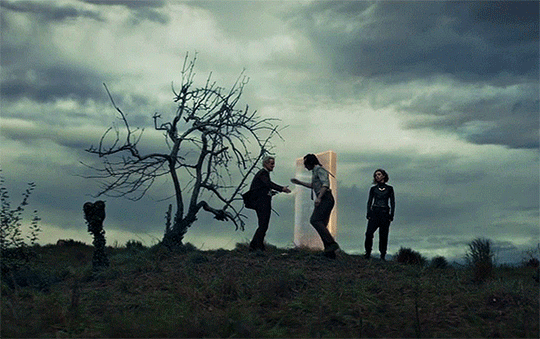
LOKI
Culture influences what we see and hear, which in turn influences artistic portrayal. Setting aside Norse myth, Marvel’s Loki is a classic example of a queer-coded villain (later canonized as a queer antihero). Deception, daggers, sexual temptation, transformation, and magic are all culturally tied to the “immoral” facets of femininity. Just as a strong, independent woman untethered to the control of man is deemed a “wicked woman”, a man demonstrating gender ambiguity and like qualities is similarly judged. Only masculinity is viewed as pure and good, and this no doubt was—and continues to be—a key force in white, western colonization’s destructiveness. It all but crushed our rich global history of divine femininity, gender diversity, and romantic and sexual expression.
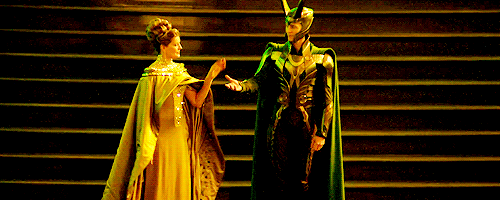
Asgard, as Marvel portrays it, is without a doubt a masculine-dominant warrior society. Only two women feature prominently: Queen Frigga and Lady Sif. Whereas Sif embraces her masculine qualities and fits in easily with Thor and the Warriors Three, Queen Frigga embraces her feminine powers, though her authority is submissive to the All-Father, Odin. Her influence is most heavily seen in her adopted son, Loki, with whom she shared and taught magic in hopes that Loki might “feel some sun on himself” despite the “long shadows [Thor] and [Odin]” cast. The magic that Frigga gifts Loki, however, attracts scorn. The subtext here is that Loki’s specialness, his individuality, comes from feminine powers despite presenting as a man, and a gender ambiguous one at that. Unlike Thor and Odin, he is not masculine. While strong, he does not exhibit Thor’s brute strength. He is cautious, thoughtful, another feminine quality, whereas Thor’s courageousness often veers toward foolhardy and brash.
Thus, if Loki cannot be loved and accepted as he is (a queer person of another race), he will force love and acceptance through the power of the throne. Kings oft inspire fear, coercing subjects to love them whether they wish to or not. But we know Loki never truly wanted the throne. The throne is a mere distraction from, perhaps even a poor replacement for, what he truly wants: genuine love and acceptance that cannot be bought. Unfortunately, Loki believes he will never get these things, which is why, when Mobius questions him, Loki’s desire for control (Loki, King of the Midgard; Loki, King of the Nine Realms; Loki, King of Space) can never be satiated. Mobius challenges Loki for the exact purpose of revealing this to him. What do you really want? At this point, Loki does not have the words to form an answer. In S2E5, Syvlie raises the question Mobius originally asked in S1E1. It is then, after experiencing Mobius’s friendship and the other relationships that come to being as a result (including Sylvie’s), that Loki can articulate his answer.
Loki’s othering, even before the discovery of his true identity as a Jotun (an allegory for a villainized foreign race), creates a lonely environment in which Loki’s potential for goodness is quashed by centuries of resentment, bitterness, and jealousy. His attempts at masculinity take the form of violence, all of which are, as Loki admits in S1E1, “part of the illusion; the cruel elaborate trick conjured by the weak to inspire fear.”
Loneliness and the desire for love and acceptance are a universal human experience, but they are felt far more acutely within our intersectional queer communities.
MOBIUS
His fascination with Loki is compelling because there are many things we can infer about its reasons. The first, most obvious explanation is Mobius’s “soft spot for broken things”, which is in some ways tied to his qualities as a compassionate, forgiving, and supportive father. A secondary explanation is a wish for partnership. We know from S1 that Mobius’s friendship with Ravonna spanned eons. We later learn in S2E6 that he and Ravonna started out as peers, hunters. They were partners on the field, but where Mobius “failed” because of his humanity, Ravonna “advanced” because of her ruthlessness. This change in relational dynamics left him partner-less. Finally, a third, less obvious reason is Mobius’s desire to express himself in ways Loki does so effortlessly. That desire may come from the suppression and repression of his own softspoken queerness in order to survive the fascist culture of the TVA.
Mobius is captivating for many reasons. Whereas Loki is a textbook example of culture viewing “queerness as evil”, “queerness as flamboyance”, “queerness as stylishness”, “queerness as loudness”, “queerness as sexual promiscuity and deviance”, “queerness as chaos”, Mobius very much aligns with the image of a straight-passing, repressed queer individual. This is an identity that does not get as much attention or presence in artistic media as it deserves, for there are many who need this representation to reflect them. He is not stereotypically queer by any means: he is not colorful. He is not stylish, flamboyant, or loud. His sex appeal primarily derives from the viewers’ attraction to his personality, though it certainly helps that Owen Wilson is quite handsome.
Combine these three reasons, and it becomes easy to see how a character (or person!) like Mobius might fall in love with a character (or person!) like Loki.
There is a certain amount of beautiful irony in how Loki and Mobius affect one another and consequently their identities. Mobius, feeling compassion toward an individual who has been brutally othered and oppressed, seeks to free Loki from the confines of his narrative, as determined by the “Time Keepers”. The only feasible way to do this is to bring a variant of Loki out of the timeline and into the TVA. Mobius then provides Loki with the opportunity to change by: acknowledging Loki’s strengths, giving Loki the chance to use his strengths in productive ways, praising Loki when he does well, listening to Loki, believing in Loki, calling out Loki, and accepting Loki as he is, with all his history, without judgement. Mobius does not try to force change like Thor or Odin. Rather, he creates an environment in which change could happen naturally. This kindness and, indeed, what becomes unconditional love by the end of S1E4, allows Loki to embrace his authentic queerness with self-love and use his feminine powers for altruism rather than masking them with self-hatred and masculine rage.
FREEING LOKI
In S1E1, Mobius is enthralled with Loki’s hijinks as the handsome, charming, devil-may-care, D.B. Cooper. This minor escapade in Loki’s life, which was likely only intended for laughs by the writer, reveals something interesting about Mobius: Loki’s mischievousness, his magic, his cunning, are all quite endearing to him when no real harm is being inflicted. That is, Loki, when not under duress, is someone to be admired when he’s being himself. We admire in people what we wish we had in ourselves, and this, at times, may lead to powerful attraction.
Loki, for his part, does much the same for Mobius. The environment (the TVA) which allowed Loki to thrive is also the same environment that has abused and constrained Mobius.
The heat that Ravonna presses upon Mobius, however, changes his tone with Loki himself. When Loki asks Mobius why he “[sticks] his neck out for [him]”, Mobius provides Loki with two options to choose from: “A. He sees a scared little boy shivering in the cold, or B. He will say whatever he needs to say to get the job done”. Option A, while insulting, has compassion layered beneath the barb. Loki, an expert at cloaking truth with meanness, sees through this and indirectly chooses what he believes to be true in the cafeteria scene: that Mobius feels sympathy for Loki’s painful childhood. The subtext of this acknowledgement is that the true means to the end is reversed: Mobius doesn’t need Loki to catch the Variant on the timelines. Mobius needs the Variant to free Loki from the timelines. The Variant is an excuse and another agent of poetic irony: when Sylvie unleashes the multiverse, she literally frees Loki of his predetermined narrative.
The conceit of S1E1 is that Mobius intends to use Loki for the “good” of the Sacred Timeline. It is important to remember that characters, while not real, are meant to mirror human complexity. Multiple, seemingly conflicting things may be true concurrently. In S1E2, we see in Mobius’s conversations with Ravonna that he deeply believes in Loki’a capacity to be a wonderful person and wants him to have the opportunity to change. His enthusiasm for these things outshines his desire to catch Sylvie.

And, because the Variant is Loki, because Sylvie is Loki, because, as she says, “[they] are the same”, Mobius’s own freeing of Loki, his unconditional love for him, cascades from Loki to Sylvie. Sylvie would not be free to live as she pleases if not for Mobius’s compassion for Loki in the first place.
In S1E4, Loki reveals the TVA’s sham. Mobius’s sense of self becomes fragile alongside his sense of partnership with Loki. But because of our sociopolitical culture’s influence on capitalism, the creative voices of the Loki series self-censures what could be (what is) a queer romance. This self-censureship makes itself known in Mobius’s own self-censureship. His jealousy and heartbreak cannot be spoken directly. It must be spoken through the words of a woman, someone who presents as the opposite sex. Through a looping memory of a scornful Sif telling Loki, “You are alone and always will be”, Mobius makes known the nature of his feelings for him.
BUT WHO WILL FREE MOBIUS?
In the same cafeteria scene in S1E2, Loki asks Mobius if he’s ever ridden a jet ski. Mobius’s response is demure, saying him riding one would “cause a branch for sure”. The jet ski gives the audience another clue as to what Mobius seeks in life: something fun, thrilling, and reckless. Yet Mobius sets aside his desires for what he believes is for the good of the TVA, and thus humanity. This suppression and repression of authentic selfhood mirrors the queer experience of living within a heteronormative culture, especially one with religious doctrines that equate pleasure with sinfulness.
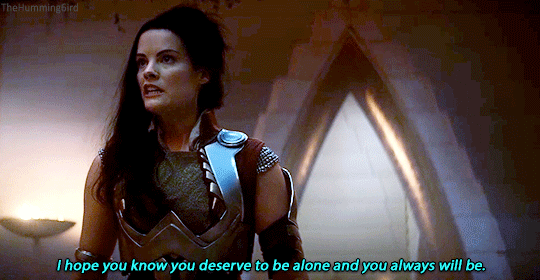
Because Mobius extended his heart, his partnership, his love (symbolized by twin daggers hidden in his locker [a closet]; notably a male phallic symbol of which there are a pair [partners]) and was soundly rejected, Mobius retaliates with the loneliness he himself feels. This loneliness may be interpreted as an allegory for the loneliness of being closeted as opposed to the loneliness of being out but othered.
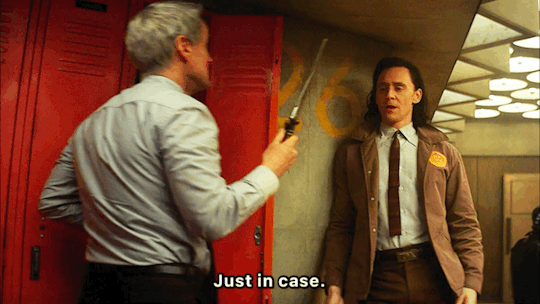
Ultimately, Mobius’s love for Loki shifts from selfish desire to unconditional love when he chooses to help Loki save Sylvie. In S1E5, it is conspicuous that after delivering Sylvie safely to Loki’s side, Mobius’s partings words are, “Guess you got away again”, to which Loki replies, “I always do”, which echos the lover’s trope of “the one that got away”.
[It drives me absolutely bananas that I can't find the specific gif I need when I literally saw it multiple times earlier this week but didn't need it THEN]
Owen’s acting choice is interesting here. He laughs, smiles, then looks down before looking up again, his eyes shifting from fondness to what feels like longing. Mobius extends his hand, a sensible choice for someone who believes his love is unrequited and is unsure of how Loki defines their relationship. Loki, appreciating what Mobius has done for him, closes the distance with an embrace and thanks Mobius for his friendship.
In S2E1, upon Loki’s time-slipping into the war room, whatever apprehensions Mobius had about physical contact was wiped away by the collapse of the TVA and the memory of Loki’s hug. In this scene, it becomes clear to Mobius that Loki is panicking. He makes the executive decision to use his physical contact as a grounding force, relocates Loki to a quiet environment, asks after Sylvie with no bitterness in his voice, then prioritizes Loki’s physical well-being. Perhaps, in Mobius’s view, his love is unrequited, but there is nothing in place to stop him from expressing that love more freely while honoring Loki’s feelings for Sylvie. This regard, which may be construed as platonic, may also be viewed romantic, courtly love.
The fight between Loki and Sylvie in S1E6 sets the stage for Mobius to receive Loki and become a refuge for heartbreak.
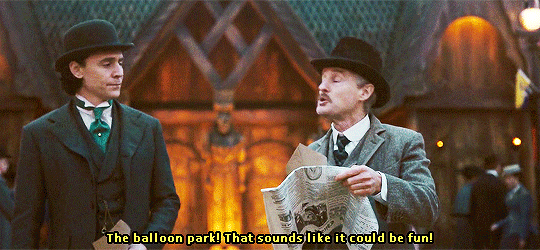
S2E2 and S2E3 has Loki’s and Mobius’s temperaments when it comes to investigating flipped. In S1, Mobius was focused on the mission and often had to reign in Loki. In S2, Mobius is more casual, more willing to take his time and enjoy the sleuthing as it unfolds, while Loki administers pressure to stay focused. The question is why?
In S2E2, Brad attacks Mobius’s sense of self. He points out how weird it is that Mobius is not at all curious about looking at his timeline and stresses that the TVA, and everything in it, isn’t real. Brad calls into question Mobius’s reason for staying. Knowing that the answer is Loki, we can surmise through the queer lens that Brad also corners Mobius into potentially outing himself in front of the object of his affections, someone he believes does not return his feelings, and whose knowledge of those feelings may threaten their friendship. This is a traumatic experience for queer people in the real world, and this extra layer of emotional conflict adds depth to Mobius’s violent response.
Mobius influenced Loki in a myriad of ways. One that has not been discussed yet is an appreciation for focus and order. Loki, in turn, has cracked the door open for Mobius to explore pleasure. We can speculate that, in his own way, Mobius is testing what happiness could look like living a life between the TVA and the timelines. For him, this means cocktails at the theater, cracker jacks, and exploring the World’s Fair, all of which are pleasurable on their own but are even more so with Loki’s company. His queerness, once again, is quiet, mundane, but playful in its own right, and finally brave enough to explore. These scenes suggest that Mobius is indeed happy at the TVA and, as we see in the finale, this happiness is solely rooted in his relationship with Loki and the emotional intimacy they share together.

Loki expresses concern for Mobius, noting that he has “never seen him like that before.” Mobius, interestingly, deflects every concern by absurdly blaming Loki: “He got under your skin”, “I was following you!” The psychological undercurrent here is that Loki is the reason why Brad got under Mobius skin. Loki is the person that Mobius will follow.
Loki takes Mobius’s distress in stride, responding in a way the Mobius normally would. However, Brad’s question piques his interest, and his own care for Mobius prompts him to gently challenge Mobius’s lack of interest in his own timeline. Mobius’s reason for avoidance is, “What if it’s something good?”
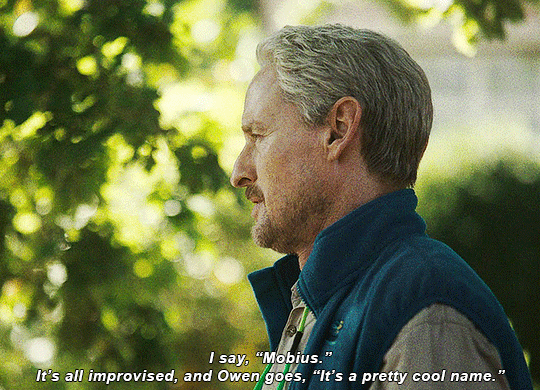
In S2E5, it’s interesting that “good” in this narrative is defined as a heteronormative fantasy of a house, two kids, and (possibly) a puppy and a snake. The “good” in Mobius’s original timeline, however, is imperfect. There is a partner that is missing (partners being a recurring theme in the series, particularly in S2E3), pronounced gone not once but twice. The entire scene between Don and Loki has been discussed at length by many, so there’s no need to reiterate it here. However, let’s bring our attention to Mobius’s avoidance of this “good” because this avoidance resonates with another queer experience.
The TVA, for Mobius, is the place where he studied, saved, and developed a close relationship with Loki. The fear of the “something good” is the fear of being confronted with something Mobius “should” want more than the TVA, and therefore “should” want more Loki. The fear is wanting something (or feeling pressured to want something) other than a queer relationship with no children. The question of “choice” is impacted by what is considered the “norm”.
S2E5 very pointedly focuses on the concern of choice, especially Mobius’s choice, in the bar scene between Loki and Sylvie. “Mobius should get a choice now, no?” At this point, Loki’s regard for Mobius has finally caught up with the romantic nature of Mobius’s feelings for him. And Loki, living his own queer experience, is also afraid of his true desires like Mobius. In being part of the intersectional queer community, the psychological need to guard against disappointment is high and commonplace. Desires are easily disappointed by the expectations of oppressive social mores. This survival tactic manifests itself with our hope and heartbreak with mainstream media, Loki the series being among them.
But Sylvie, the harbinger of true and absolute freedom, takes on the role of supportive ex and challenges Loki to answer Mobius’s question in S1E1: “What do you want?”
In this, Mobius and Loki’s individual relationships with the TVA are identical. It was never about where (the TVA), when (time works differently at the TVA), or why (the timelines). It was about who. It was about each other. The TVA represents a liminal space which became home by virtue of the people who brought love into it. The TVA is code for Loki and Mobius when each speaks of it.
Again, the artists behind the media must self-censure. In this, Loki also self-censures while giving the truth. “I don’t want to be alone. I want my friends back.” It cannot be denied that Mobius is Loki’s first truest and closest friend. “I don’t want to be alone. I want Mobius back.” Sylvie appreciates and validates this desire, but also points out that showing the TVA is something that cannot be unseen. The implication of this response suggests that Sylvie believes that Loki’s friends will feel compelled to join the TVA out of moral pressure. She reiterates the true lives that are being lived, and Loki, loving his friends, loving Mobius, elects to not take that away from them. “You are just fine without the TVA.”
Yet, Loki must choose an act of profound selfless love to save everyone. In doing so, he saves and frees Mobius in the way Mobius saved and freed him. The tragedy and, once again, poetic irony is that they both would have chosen each other. In giving everyone freedom, the true freedom of Loki and Mobius is sacrificed. This double-standard reflects in our reality between those who identify as cis and heterosexual and those who do not.
When Mobius looks at his timeline in S2E6, he does so for one reason: that timeline survived because of Loki’s sacrifice. He must honor that sacrifice and see what Loki protected. Mobius appreciates what he finds, but he doesn’t belong there. It is not what he ultimately longs for. And there must be worry, shame, in recognizing he would prefer to give up the house and two children if a life with Loki were a viable choice.
We all experience loss in our lives. Loss without a goodbye is also commonplace but is another pain that is more acute within the intersectional queer community. I speak of missed opportunities for happiness due to external forces. I speak of loss of self. I speak of loss of friends and family and home. I speak of death, losing a loved one without a goodbye, because same-sex lovers are not considered next of kin, an impossibility without marriage. Marriage echoes back to Don, who has no spouse, and Mobius, who has no partner.
#asks#loki#mobius#lokius#loki season 2#loki series#loki meta#my meta#loki analysis#my analysis#queer community#queer#queer representation#queer relationships#lgbt representation#lgbtq community#lgbtqia
246 notes
·
View notes
Note
How would you make mario a villain?
Huh! Tricky one. I mean, there's tons of Newgrounds parodies about how fucked up it is that Mario goes around crushing turts all day, and there's the obvious "silent scary henchman of the image-conscious dictator" angle. Tricky to cast him as the villain rather than the muscle, though...
There's only one thing that notably motivates Mario, and that's Princess Peach. Extreme devotion, there. For him to have agency, she needs to be removed from the picture- and I think that neatly answers the motive thing, too. Peach hasn't been kidnapped, this time- there's something more permanent. But what? "She's been killed and he's out for revenge" is a little 3edgy5me, and also if Mario sets out to get revenge I think he just gets it. His antagonists have rarely put up the kind of fight that would require him to concoct a villainous scheme.
Who's the protagonist, if not Mario? What is Mario doing that requires someone else to go on an adventure opposing him? How do we make this something that Nintendo would actually consider releasing?
...Okay, what's Mario's usual M.O.? How do we make that villainous? He... goes to dangerous places, nimbly circumvents all obstacles in his way, and claims powerful, usually star-shaped magical objects, in order to rescue the princess. This time... he isn't really concerning himself with who the rightful owners of said magical objects are.
It's a Where in the World is Carmen Sandiego situation. There's been a rash of heists committed by a strange masked phantom thief, and the protagonist's job is to find out how the relics were stolen and where the culprit hid them, and get them back before their clients suffer dire consequences as a result of missing-magic-item-itis. You investigate crime scenes, pick up the phantom thief's trail, chase him down, and bop him one but good to recover the relic and save the day.
This is complicated somewhat because this phantom thief is in league with Bowser, who keeps causing trouble in ways that the phantom thief takes advantage of to get past security. The Koopa Troop often assists the phantom thief in his getaways. Why are they working together???
Flash back. Mario standard plot- Bowser has kidnapped the princess. This time, he's done it using some magic item or invention doohickey whose provenance he doesn't quite understand, which has turned Princess Peach to stone. True to form, Mario goes through several another castles and thrashes Bowser and breaks his evil doohickey, and... uh. This fails to rescue the princess. She is still a statue.

Bowser doesn't know why she's still a statue, and both of them panic. How do they fix this?! They need to try something- find some new magic thing that'll bring her back! They've heard of the Sacred Star of Healing in one of the neighboring Kingdoms (which exist in infinite supply in the Mario universe to be adventured through precisely once and then forgotten about forever), and agree to work together to steal it and use it to restore Peach.
It doesn't work. They ditch it somewhere. They follow up on another rumor- the Golden Coin Spirit in the Treasure Kingdom or whatever, and that's a bust too. And after a couple of these, the international community is forced to call in an expert to catch this thief and bring him to justice.
So who's our protagonist? Who in the Mario universe is a famous detective who specializes in guarding star-shaped magical relics from would-be burglars? WHAT IMPROBABLY LARGE-BRAINED PENGUIN COULD POSSIBLY THWART THIS MASTER CRIMINAL?!?
#villain ask meme#i'd kind of like a subplot where it turns out peach is just like#fully alive and somewhere else and the statue is just a statue that got swapped out somehow#hence no attempts to magically restore the statue succeeding#but idk how to do that without it being her fault for not just letting people know she's alive and solving the plot#i'd give it more thought but this is long enough
109 notes
·
View notes
Note
what do you think his thoughts were at that moment?
this is an insane question and i am going rabid trying to answer it. for context this is about my. link dead on the fucking floor compilation. i. e. "what do you think went through link's mind as he all but DIED in precalamity botw."
i've thought about this before because. well obviously i have. look at how many times i've drawn it. i think context matters more than anything when examining that moment, because it's essentially the culmination of link's entire life up to that point in the worst way possible. you have a kid who has been raised to either win or die. those are his only two options. he's known this for basically as long as he can remember. either he defeats the calamity like he's supposed to and lives the rest of his life as an untouchable gold standard of soldier, as proof that all that pressure and pain he suffered worked, or he dies and dooms everyone he has ever loved to suffer horribly for the rest of their likely very short lives. And i do think he thought about this extensively, because how could you NOT, and i think that he probably believed that death was the most likely outcome. He was raised by a soldier, around soldiers, to be a soldier. soldiers are practical. soldiers strategize for the most likely scenario. they're not pessimistic, but they know how to look at a situation objectively and make a judgement call. Looking at link's situation objectively, it would have been obvious that he couldn't win. he was one kid, a 16-year-old boy, with maybe some above-average swordsmanship skills, but too many variables were missing. he couldn't hear the sword's voice. zelda's power wouldn't manifest. Hylia, who should have been there guiding them through this prophecy that SHE had supposedly inflicted on them, was completely silent. the divine beasts may have given him some hope, initially, but it was clear below the optimistic facade that hyrule was toying with very dangerous forces they didn't truly understand. I think he very likely went into that confrontation with the calamity anticipating death.
what's most interesting to me about the scene of link's death isn't that he fell, but WHERE he fell. because he didn't die in the sanctum, at the scene of the calamity's birth, as one might have expected. he died in an empty field along the road to a fortress that might have been able to protect him. Link, the bearer of the triforce of courage, the boy raised to die a martyr at the hands of the calamity, who had all but accepted his fate before the monster even showed its face, chose to run for safety, what some might call the coward's approach, instead of dying where he stood at ganon's hand. and it seems almost out of character at first, when you think about the person he was when he first met zelda, the person who would do anything in his power to show no weakness, to take the pain and the stress without flinching or faltering. the boy who so completely embodied that idea of "courage." but i think that zelda was the piece that changed him. If it had just been him at that final confrontation, maybe he wouldn't have run. maybe he would have been content to take his final stand and accept the death he'd been promised. but zelda insisted on being there, too. "there must be something i can do to help." and while link was a soldier, more than willing to engage in self-sacrifice, he was also a knight, sworn to protect this girl, and so he couldn't in good conscience sacrifice HER, too. so he ran. he tried to live, at a moment when he should have expected to die. and i think that was infinitely more courageous of him. to go against everything you have ever known and expected is infinitely scarier than accepting the outcome you've always anticipated. Running for his life (and for zelda's) was running into the unknown. escaping death in that way was defying everything he'd built himself up to be, everything everyone expected of him. Who is link if not the hero who faced the calamity with courage? what would he have to be if he could not be what was expected of him? in that moment, he made the choice to step into the unprophesized timeline, into a world where his actions were no longer defined by some great all-seeing power. and that was the most courageous move he could have made in that moment. he must have been terrified.
so what was going through his mind as he made his last stand? Honestly, i think the only thing on his mind was zelda. I don't think he cared about himself, his physical condition, any of it. I think he made the choice to run because of zelda and so he made the choice to take his final stand where he did because of her, too. just before zelda's power manifests, we see him try to continue fighting even inches from death, so gravely injured that he's unsteady on his feet, using his sword to keep himself standing. i think he must have known that he was in no condition to fight anymore, but he expected death to come for him at one point or another. what mattered was that she might live as long as he kept going. that's why he ran in the first place. not for himself, but because zelda was there and zelda didn't deserve to die like this. Even once zelda's power manifests, link only gives up and allows himself to fall once a beat or two has past--once he's sure that there really is no more danger. that she'll be okay, that she can make it past the fort and into relative safety even if he lets go here. He collapses then, and only then, after running miles through fields and woods, already gravely wounded, because in that moment he sees that the danger has past. a soldier's work is only done when there is nothing left to fight. a knight's work is only done when his princess is truly safe.
maybe he was relieved that he'd managed to hold on as long as he had. that he'd been able to find her some form of safety, in one way or another. maybe he worried about what manner of things would come for her once he was gone. maybe he wondered why she wouldn't just leave him and run for the fort. i'm sure there was a flash of regret in the back of his mind, for the family and friends he'd leave behind, for the people he'd let down, for the calamity he wasn't able to defeat. but this was the outcome he'd expected, even if it had come in a slightly different form. Even if now there was a girl hovering above him begging him to open his eyes.
#can you tell i never stop thinking about this specific moment? lol#i still think my loz dissertation line about this moment goes hard btw.#'There is a flash of golden light. He cannot raise his head to witness it. but it is warm. so warm. it feels like safety. like home.#He closes his eyes and breathes in. he is sure he is dying. This will be his last breath. At least it will be warm and soft and golden.'#like damn ok 2021 blue. you get it. go off#asks#zelda analysis
203 notes
·
View notes
Text
Thinking about the fact that most of Tims character arch is based around him actually dealing with the things from his past
Like a major part of tims character is his denial of the things that happened to him-- his repression of memories, chalking things up to hallucinations, suffering in silence, brushing off any concern from those around him ("Tim what's that?" "Just some medicine I need to take" "Are you sick, do you need to go home?" "No I'm fine.") The fact that he never mentioned his medical history or his time at the hospital to Jay until he was basically forced to.
And what was it that finally made him tell Jay about the hospital? The operator directly attacking him and making him relive scenes from his past. It wasn't until he was forced to realize what was at stake, forced to essentially confront the danger he was in by bottling up his past, that he willingly (at least somewhat) shared that information with someone. I do like to think that maybe Tim opened up to Brian in college, but as far as cannon evidence, we only really see Tim willingly talking to Jay about it. Brian knew, sure, but it's just as easy to assume he found that after the fact-- that he caught Tim in the lie, rather than Tim telling him outright.
And Tim really isn't a great liar, either. Like I know we talk about Jay being a little bit of an idiot (rightfully so) but Tim's main course of lying is. The most obvious deflection in the world. When Jay mentions the tape in his house, Tim's response is to immediately deflect ("I'm a little more worried about my house right now.") which would be a smaller thing if Tim wasn't intimately aware of how important it was to find and watch any tapes they possibly could. Tim's only method to coping with things that happen to him and the people around him is through denial, even in times when it would be infinitely more beneficial to acknowledge the issue at hand.
What's even more interesting to me is that Tim is seemingly the only character that makes any genuine progress in fighting against the operator. But that comes with the caveat that Tim is only able to do so when he actually confronts the operator, and by association, the issues of his past.
The only way he and Jay are able to make amends and move on is by Tim telling Jay about the hospital, which was only spurred on by Tim being forced to relive his trauma. Right after Tim tells Jay to stay out his life, he (by force of tta) has a relapse and ends up paired with Jay anyways. The only way he's able to get Jay and himself away from Alex's house in one piece is by literally physically standing up to the operator. In the fight against Alex, the whole time he's being ported around, he is monologuing about his past-- he's finally acknowledging the things that happened to him, that they weren't his fault, that they affect other people, and that violence isn't the answer to dealing with them-- that isolating yourself and denying the truth of what's happening isn't the answer.
And of course this is all tied back to the metaphor of mental illness: the fact that you cannot deny the things that have happened to you if you have any hope of moving on from them. you can't lash out or harm others because of your trauma if you have any hope of moving past it. The reason Jay, Brian, and ultimately Alex all died is because they were incapable of facing their issues head on; they all turned to anger, isolation, violence, and otherwise feeding into what the operator wanted, or alternatively, feeding into the misery spiral of their mental illness, rather than finding healthy coping mechanisms to heal from and move on from it.
God I need to write a full analysis essay about him OKAY I'm ending it here these aren't all my thoughts this doesn't make sense but I'm ending it here thank you for watching goodbye
#robi rambles#marble hornets#tim wright#jay merrick#mh spoilers#i love him i love tim i love him#i hope creepy swes this creepy this ones for you i hope you like my tim meta ^-^
133 notes
·
View notes
Text
Highlights from “The mind”
[session 10 of “Keys to the ultimate freedom” by Lester Levenson]
♡ The mind is an instrument created by you to imagine the Oneness as chopped up and separated into many parts interrelated.
♡ The mind is simply the sum total composite of all thoughts.
♡ The mind becomes habitual.
♡ The subconscious mind is running us - making us the victims of habit.
♡ The thing that keeps us from recognizing and expressing our infinity is simply the mind, conscious and subconscious. If we are to express this infinite nature, we can do it only by getting behind this mind. When we reach the realm behind the mind we operate without thoughts, intuitively, and are in harmony with the whole universe.
♡ The direction is to still the mind. Quiet the mind and you'll see your infinity right there.
♡ Just let go of the mind completely and what's left over is your infinite beingness, all knowing, all powerful, everywhere present.
♡ Were we to direct all our energies to stilling our mind, we would soon be realized.
♡ You feel as good as your mind is quiet.
♡ Your mind is an instrument used to identify your real Self with your body and world.
♡ If you do not identify with your body or mind, neither your body not your thoughts will effect you.
♡ In this dream-illusion there's a thing called thought. And thought determines and is the cause of all matter.
♡ In your imagination you have written and projected a cinema show of acts, actors and audiences on a screen and have lost sight of the fact that it is all in your imagination, your mind. Discover this and you discover the absolute Truth.
♡ The world and universe are a mental concoction.
♡ A thought is an assumption of lack causing a wish to fulfill it.
♡ All thoughts are of non-truth.
♡ You've got to use the mind to quiet the mind. You need to use determination to still it.
♡ Without concentrated mind, progress is relatively small.
♡ A wandering, wavering mind is one that dissipates one's energy in the form of many thoughts. Hold one thought and the energy is less dissipated and more conserved.
♡ Direct this conserved energy toward the Self.
♡ In the beginning the mind pursues the Self intermittently between long intervals. As one continues, the intervals shorten. .Toward the end, the mind is constant in the pursuit and does not wander from it.
♡ The more you eliminate mind, the more peace you feel.
♡ The mind will never discover the Self because the mind is the cover-up over the Self. It's only by letting go of the mind that the Self is seen. You get the mind quiet enough to allow your Self to be obvious to you so that you may use It to let go of the mind.
♡ Eliminating what you are not is growth.
♡ Every mind uses the very same unlimited intelligence. Everyone uses it as much as he believes he can use it to fulfill his desires. When he learns that his mental limitations are self imposed, he lets go of them. Then his intelligence (I. Q.) can be raised to the degree that he knows he has no limits.
♡ We are all in the same mind and the only thing that keeps us from reading the other one is that our attention is too centered on our own little self.
♡ All minds are influencing each other.
♡ Thoughts smother the capacity to be happy.
♡ Anything man can think can be.
♡ The ego-mind struggles for survival and tries to subvert your direction.
♡ The mind cannot give the ultimate answer because it's part of the ego, part of our limitation.
♡ When the Self, which is just behind the mind, is discovered, you see that the mind is limited and let go of it.
♡ Where is the world without your mind? Is there such a thing as world when you submerge the mind? The thought of the world creates it. This whole solid universe that you mentally say is a solid universe is just your thought that it is a solid universe.
♡ Anything your mind is absolutely convinced of materializes instantly.
♡ Mind can do anything with the body.
♡ Every thought is motivated by a desire for pleasure or an aversion to pain.
♡ Letting go of all attachments and aversions is letting go of all your thoughts.
♡ The only thing we are aware of is our own thoughts.
♡ What we're seeing out there is our own mind.
♡ The mind can be made quiet wherever you are. The place to do it is right where you are.
♡ As mind gets quiet, first the sense of havingness decreases until a measure of security is felt. It becomes less necessary to have in order to be. Then the sense of doership decreases until a further security is felt in that one is not the real doer, that the real doer is a higher power, that one can actually be with much less doing and it becomes less necessary to do in order to be. Finally your real Self that has always been in the background steps in and takes over and you feel that there is nothing necessary any more that you must have or do, that there is no choice but to only be!
♡ Unless we're eliminating the mind, unless we're eliminating ego, we're not progressing.
♡ The more we keep looking into the mind, the quieter we become.
♡ If I am separate then there has to be others, he, she and it. And you start dividing up the One by first becoming an individual separate from It. Thought first divides and separates you from the One Beingness, and then creates a multitude of beings and things and all the relationships. It's all your thought, that's all it is.
METHODS OF MIND REVELATION
♡ See the source of the mind and you will find your Self.
♡ Turn the mind back upon the mind and it will reveal its secrets.
♡ Eliminate the ego. The ego thinks and causes all thought. The ego is the identifier of the Self as the body.
♡ Surrender the mind to God.
♡ The mind must be eliminated permanently by realizing that it is not real but only an apparency, an illusion that has its source in your Self.
♡ Where there is only subject and no object, there the Self is.
184 notes
·
View notes
Note
there's so much to love and examine in the last two episodes, but I'm still a little bit grieving the fact that Lolth made Opal fully forget Ted, which, if my understanding of the recent Luxon lore drop is correct, means she has forgotten a part of her own soul. am I understanding this correctly??? because damn. damn
I WAS THINKING ABOUT THIS AND I THINK SO BUT IT'S SO WILD like honestly it's almost Tealeaf vibes but in the opposite direction. I have no answers only questions and a lot of musings.
I do think the way the concept of the soul is established in Exandria is absolutely FASCINATING, because it has the vibe of like... an entity that cannot be fragmented in a way that destroys it. The soul is malleable but always entirely whole and essential. Molly and Kingsley, in spite of being theoretically fragments of Lucien's shattered soul, are whole (and distinct!) people. Opal is always a whole person, and Ted is seemingly distinct in the way that twins can mirror each other in many ways but are distinct regardless. (I don't really understand the past situation there admittedly because it sounds like Ted was a physically distinct person as well to the extent that other people knew her. What is UP with that Luxon cult, dammit, I need to understand this immediately.)
But the thing with this is that it has a really obvious direct analogue in canon: beacons themselves! They are, theoretically, some sort of by-products—more metaphysically, shattered pieces—of a divine entity but they all seem to contain the same infinite space within them, and the liquid dunamis notwithstanding (because I think that is less a beacon than dunamis itself), we've seen that even further broken down into smaller parts with the gems found in Aeor, which seemed to be manmade. And they too allowed a person to peer into that same space.
In theory I do wonder if this would suggest that perhaps Opal's memories are not quite as lost forever as they might seem, but it's really hard to say! I still favor the idea that dunamis is the foundational matter of the universe and that it interacts with memory as such, and if that's the case, then it's possible that whatever connection she has to the Luxon could be utilized to bring at least portions of them back, since she is not the only one who remembers Ted, and the Spider Queen can't exactly root out everyone's memories when she doesn't have a direct line into those other minds.
I don't know what any of this means and I am just rambling at this point but I am still holding so tightly to my own conceptualization of dunamis because it continues to track and I need to understand.
97 notes
·
View notes
Text
How to Get Better at Tarot (and other divination)
If you often find yourself stumped with a reading, or you're just getting started and are totally lost, this post is for you! I'm using tarot as a base, but this guide will help you learn how to improve your reading skills of any divination. I'm basing the points in what I've struggled with in the past, as well as stumbling blocks I often see other people get stuck on.
Step One: Practice. You hate this advice, I know, but it is the only way to actually get better. You have to fuck up. You have to try again, that's just how the world works. Sorry. Getting good at anything, but especially something as amorphous as divination, takes years. I have been practicing tarot for nearly five years, for less than half that time have I felt the click of confidence. Tarot is an investment!
Okay. You get it. You have to practice, but how do you practice? What can you do to make your practice more beneficial? How do you get the most learning you can out of every reading? Let's dig in!
Use Smaller Spreads
Simplification is your friend. If you draw too many cards, it muddies the water. Think of your reading as a bowl of water, and each card you draw as a drop of color. If you add one drop of red, and one drop of blue, the answer comes through as a clear purple. But if you start adding more and more drops of every color you can think of, the colors get all mushy and gross. If you frequently find yourself drawing more than four or five cards for a spread, chill! Your don't need that many, I pinky promise. As you gain confidence, you can add more cards. The goal here is to get clear answers, and pulling twelve cards is not going to get you there. I recommend sticking to one, two, or three card readings. Remember that tarot decks typically have 78 cards; when you get up to ten or more cards, you're pulling a significant portion of the entire deck. No wonder it doesn't make sense!
Ask Better Questions
There are good questions to ask your cards, and less good ones. For a start, tarot is not good at yes/no questions. If you are expecting a yes/no answer, turn to something like a pendulum or a coin toss.
Okay so that one is a bit obvious. Let's dig a bit deeper. When you pull out your cards, take the time to sit and think about why. What do you want out of this reading? Think about what cards are in the deck; do any of them actually work to answer the question you have? For example, if you're doing a deity confirmation, simply asking "who are you?" and drawing a card isn't going to work very well. There isn't a card in there with "Dionysus" written across it, and there are infinite possible answers. Instead, think about what could point you in the direction you need. "What's your vibe?" works a bit better. Then we could get a card such as The Devil, to stand for the indulgence and physical delights of wine. If this were the first question (who are you?), your first instinct would be 'ohmygoditsthedevilhimself! This spirit must be evil!' Instead, you know that the vibe is about something maybe a bit mischievous (taboo, even), or someone that was cast as the devil somewhere in history. Combine that with something like the Three of Cups and it's practically a neon sign saying "Hey! My vibe is about having a good time! Let's drink and party!" which leads right to my homie Dionysus.
Question phrasing is important. When you go into google and type in "Tarot Spreads" you get a lot of junk that tries WAY too hard to sound super smart and spiritual. "What part of myself do I hide from observation out of fear and/or shame?" Can be boiled down to "What am I ashamed of?" When I started tarot, I got most of my spreads by googling "tarot spread for ---". This works, but I often found myself pulling the cards, looking at the questions, and realizing I didn't actually know what the question was asking. If you find yourself in the position, try boiling down the question to it's essential parts.
Align Your Expectations with Reality
This ties into the above step, but I feel it deserves its own section. Tarot and divination are a tool we use to gain understanding of ourselves and those around us. Tarot is good for this! Play to this strength. Tarot can be used for practically any question, but there are some things that work better than others. Start with the things tarot is best at, then branch out to the more challenging questions! Think about what the cards themselves are able to say.
You should also be careful to consider if you should even be asking this question with divination. I have strict rules in place for what types of readings I accept. I do not use my cards to read the future. The future is ever changing, with infinite possibilities. I prefer to just let it happen. I do not do readings about school or tests (you're at school to learn! Not be told!). I do not do readings about medical problems. Those should be asked of a doctor. Morally, mixing the spiritual with physical health is not acceptable. When you turn to divination, ask yourself if divination is really the best way to get what you need.
Do Not Doubt Your Card Draws
Okay. So you've now thought about what you want from the reading, you've picked your questions, and now, finally, it's time to pull some damn cards. You shuffle, you draw, you flip, and --- wait a second, that can't be right?! Why did I get that card for this question?! I must have shuffled wrong, or picked the wrong cards!
Nope! You didn't! (Trust!)
Look at the cards. Observe them. Open your guidebook (I swear to god you need to actually use your fucking guidebook do not try to go without it oh my god--) and read the entire entry for every card. Sit with them some more. What jumped out at you in the descriptions? Trust your instincts! Meditate on them. If you don't get it, don't fall into the trap of drawing additional clarification cards. Remember the first tip? More cards equal a muddier reading.
Fine, you say, but what if the cards are really weird? What if they make less than no sense actually for real? Write that shit down in your journal, and wait until it makes sense. I'm serious about this. Sometimes readings only make sense months down the line, and sometimes it's above your current skill level. Interpret it to the best of your ability, and check back in six months later. If you're super impatient, try reaching out to someone who's ability you trust and ask their opinion! Just don't be offended if they say no. Interpretation is a lot of work!
If you (like I used to) continuously struggle with doubt about how/where/when to draw, how much to shuffle, and if you picked the right cards and maybe you should just scrap it and start over... Stop yourself. Come up with a routine and rules for the draw! Tell your deck "okay, one more shuffle, then I'm pulling!" and do that. You gave your deck the notice it needs to get its shit together, trust it!
Do Not Take the Cards Literally
You've heard this one. Everyone says it. But what does it mean? How do you not take the cards literally?
Let's start with the example everyone knows.

XIII. Death
Whoa! You say, scary! Well, not really. Death indicates the ending of something, but not necessarily a life. Perhaps you're graduating school, and saying goodbye to that part of your life. Perhaps you're ready to move on from an outdated way of thinking. It depends on the context! Death is about cycles, about closing one door so you can open the next. This is really where the practice is going to set in.
Let's take a look at another one that tends to really ruffle peoples' feathers.

"Oh shit! It's XV. The Devil!"
Is Satan himself in the room with you right now?! Probably not. Does this mean something evil or bad is going to happen?! Is this a sign that everything is cursed?! Also no. I've seen plenty of people balk and backpedal as soon as The Devil turns up in a reading, but really they're balking at nothing. The Devil does not mean some evil spirit is trying to trick you. The Devil asks you to interrogate the taboos in your life and in the society around you. The Devil says "hey, wanna buy some Deathsticks?" Sometimes the answer is hell no, and sometimes it's "Fuck yeah Obi-wan wants to party!!!" Remember back a few sections ago, and I used The Devil as an indication of Dionysus? That's because Dionysus is the god of wine, of the party, the physical indulgences that society tells you are wrong.
Learning to Not Take The Cards Literally is hard, and takes practice. But that's why we gotta practice!
Be Not Afraid (of your guidebook)
The guidebook loves you. The guidebook wants to help you. The guidebook is there to guide you! Use it!! Too many readers place too much emphasis on doing readings without the guide, on being independent, and not using the "cheat sheet". Look into my eyes. That's bullshit. Complete and utter bullshit. Memorization is a completely different skill from interpretation. Memorizing will leave out the details, the little things you forgot (and unless you have a photographic memory, yes, you will forget things). Sometimes all I need for a reading to click is one word in the guide, something I wouldn't have thought of without reading the book. Every deck is different. That's why they give you the guide. Someone put so much effort into the design of the cards, into the meanings behind the art. When you skip the guidebook, you're ignoring all the hard work that went into it. Don't make that writers work go to waste. Don't make them sad :(
How To Make Your Interpretation Better
Okay. You're trying not to think literally, you've read the guidebook, now what? "Good" tarot readings are incredibly subjective, and everyone will have a slightly different metric. But this is my post so we're using my metric!
Good tarot readings give you more questions. Good tarot readings ask you to interrogate yourself, and look at the real and true answers. Good tarot readings make you learn about yourself and the world around you. Good tarot takes into account the symbolism of the cards and melds it with the words of the guide. So let's take a look at some symbolism.
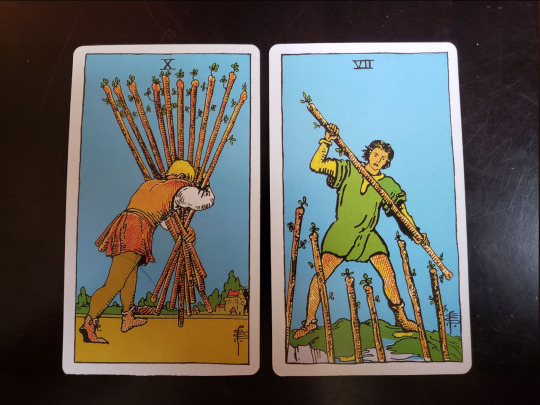
The Ten of Sticks and the Seven of Sticks. Starting with the ten, what do we see? Some dude with some sticks. But wait -- he's holding all ten sticks by himself. His back is bent, his arms are full, and we can't see his face. The ten of sticks is about carrying burdens, about responsibility.
Now the seven. Some rando just holding a stick, right? Take a second glance. He holds the stick like a staff, a weapon, in a defensive position. He stands on a hill, and we see him fending off all the other sticks. The seven of sticks is about taking a stand for what you believe in, having the conviction to stand up on a hill and fight for it!
If you draw the ten of sticks, ask yourself if you're overburdened anywhere. Think about the responsibilities in your life, if they're enough, if they're too much. If you draw the seven, think about the things you believe in enough to climb that hill. Why do you believe those things so strongly? What drives you to the defensiveness behind your position?
Symbolism is another one of those skills that will simply come with practice and time! If you don't get it, don't beat yourself up. I highly recommend getting your hands on an app or book that breaks down both the meaning and symbolism of the cards for you to reference (Galaxy Tarot is my favorite).
Something else you can do to increase your understanding is to study readings other people do. I learned so much from watching my partner interpret readings (@knightofhylia <333). Look at the cards and the interpretation, can you follow along, or do you get lost? If you're lost, pinpoint what threw you off track and focus in. Pull the cards out of your own deck, lay them out, read the guide. Did you come to the same conclusions, or something completely different? Why? How? Which interpretation do you like more? Why do you like that one?
Divination will always be a highly personal experience. To know your cards is to know yourself. Tarot was not designed to be easy, it's an esoteric skill. By definition, the esoteric is difficult to understand and grasp to beginners and outsiders. The esoteric is supposed to leave you pondering, wondering, and asking more questions. With perseverance, you too can learn to understand the mysterious!
#Tarot#divination#tarot cards#cartomancy#card divination#beginner tarot#how to read tarot#tarot guidance
104 notes
·
View notes
Text
Random worldbuilding from The Unfinished Book:
While there is no unified, clearly defined LGBT community, the people who would by our definition fall under that umbrella are heavily associated with religion. While the general cultural assumption is that everyone is at least a little bit bisexual - the idea that almost everyone hypothetically could encounter a woman so handsome or a man so beautiful that they'd go gay for them is aknowledged well enough to be a common theme in poetry and literature - being queer is more or less considered a way in which various gods "earmark" their own.
This is considered a matter beyond obvious - there are whole creation myths of how the gods who created the world grew annoyed about how all the humans they made were too busy having and raising their own children to properly focus on worshipping their gods or caring for society at large, so the gods saw fit to create people who would rather love their own sex, or not desire marriage or children at all, to ensure there are some whose hands and minds are free to focus more on the gods.
The Empire tolerates any and every religious practice that doesn't threaten the state, break other laws or cause public disturbance, so while there are some major gods whose temples are in almost every city, the pantheon of gods whose existence is aknowledged is essentially infinite. The churches, temple organisations and schools of various major gods, goddesses and ambiguous divine entities and their devoted priests and servants aren't simply there, but play a part in society and politics, as bankers, historians, librarians, curators, doctors and educators. Some run orphanages.
One big, major player in the field is the order of the Moon Goddess. They don't literally worship the moon, the moon is simply the symbol of the Goddess, whose realm is the perfect logic and structure of the universe, which cannot be touched or even properly comprehended by the fallible and imperfect human mind. Their philosophy is that there is no such thing as a question without an answer or a thing without purpose, and anything that appears so is simply beyond human grasp. While there are Moon Priestesses who aren't trans women, they are few and far between, and still less rare than trans women who aren't priestesses.
This is considered an example of how clear and logical the Moon Goddess is - the dysphoria of AMAB people is culturally regarded as them feeling a calling, a call that cannot be mistaken for anything else, a puzzle with one logical answer that they must personally find and embrace, which cannot be disputed by any mortal force, and can only be denied and repressed for so long by the Chosen Subject before they accept it. Becoming a Moon Priestess isn't an "I don't know what to do with my life so I might as well do this" choice in life, it was a choice that was made for you before you were born.
In the book, the protagonist encounters a trans man on his journey and they travel together for a while. After discovering the nature of how Terrel is, the protagonist isn't baffled by the idea that trans men exist at all - mainly he is unfathomably relieved that this small and boyish youth who drinks, gambles, fights, fucks and commits murder like a grown man is actually older than himself and not, like, thirteen - but astonished that Terrel isn't religious, and doesn't consider himself "chosen" by any god. He just is, and as far as he's concerned, the gods have nothing to do with it.
Also it suddenly makes a lot more sense that his name translates to "son of a hyena bitch", something that no woman would name her own child. He named himself, and his mother is a huge bitch.
379 notes
·
View notes
Note
Hey, I was re-reading ATLWETD when I noticed something so obvious in this paragraph that I stupidly didn't notice the first time.
"Riddle was taller than him, so now his lips were almost brushing against Harry’s forehead.
“I don’t need to live in a Muggle world to own someone,” he murmured. Belatedly, Harry realised why he was standing so close — he didn’t want others to overhear his outrageous statements. “You should know this. After all, you know me better than anyone.”"
He wasn't gloating only about the death eaters, like Harry thought, he was mostly referring to the Horocrux situation and their own really unique relationship (also, the fact he almost kisses the scar as he speaks made me scream).
Will we see more moments like this in the next chapters?? (If you don't want to spoil us, just ignore this part.)
This all brings me to the actual question: Harry replies:"It’s because I know you that I’m not going to entertain your disturbing fantasies,” he said. Somehow, he managed to sound less harsh than he intended. “No matter what loyalty anyone promises you, it is not infinite. If you treat people who pledged themselves to you cruelly, they are not going to stay. I saw it happen. And by the rate you’re going, I think it might happen again.”
What the hell did Tom assume from this reply? And most importantly, what assumptions did he make about the connection between Harry and fake!Tom based on this answer?
Hoping the best for you and your loved ones in these hard times <333
Hi! Thank you <3 I'm glad that you saw the second meaning of Tom's words. It was related to how Tom envisions their relationship and to the Horcruxes both.
The more Tom imagines what life he and Harry might have had, the more feelings and desires are born in him. He's certain that Harry was his in every way and that he had absolute control over him because in his eyes, that's the only possibility for them to have a relationship. This is what he began to want now, so he's sure that any other version of him must have wanted the same. Harry cannot relate to it, ownership doesn't interest him, so he didn't fully comprehend what Tom meant.
I cannot say specifically what kind of moments of closeness and possessiveness we'll get because I never plan these things, they pop up by themselves as I write! But there will definitely be a lot of them))
As for your second question, Tom and Harry are having somewhat different conversations here. Harry is talking purely about Tom's followers, Tom is talking about them and about his bond with Harry at the same time. Harry's words made him think that he lost the devotion of some of his Death Eaters in that other reality, but most importantly, he contemplates the fact that his attitude cost him Harry. He doesn't know the specifics, but he thinks that his insanity pushed Harry away and resulted in him being snatched into some other world. Harry doesn't seem to be actively trying to go back to it, which Tom considers as another proof of their broken bond. In his mind, with their connection, Harry would have to be obsessed with reuniting with 'his' Tom. Since he isn't, it means that the other Tom failed him so much that Harry is now more interested in building something new with his other version.
Tom is confident that he'll be a better partner. At the same time, while he places Harry above everyone else, he doesn't see him as his equal, and he cannot imagine a relationship without any violence and control in it. He thinks Harry mostly accepts it, only that 'his' Tom overdid it because of the Horcruxes. So after Harry's reply, Tom's trying to assure him him that some violence is an inherent part of a relationship, and that he's in his right mind, so he'll know how to keep a balance between violence and fondness - basically, that he'll succeed in being a leader that Harry (and the others) would be glad to respect and follow both in 'professional' and personal capacities.
This probably sounds a little messy, but Tom's mind is still reeling from all the (fake) revelations, so he cannot always settle on a specific picture) It keeps changing.
62 notes
·
View notes